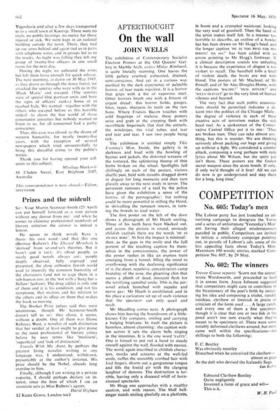Prizes and the midcult
Sir: Your Martin Seymour-Smith (25 April) can put himself forward as a sour person without any demur from me: and when he comes to claiming professional standards of literary criticism the answer is indeed a lemon.
He seems to think novels have a thesis—his own word—and that this one (Bernice Rubens's The Elected Member) is `derived' from so-and-so's theories. But it hasn't and it isn't: it's about people, as surely good novels always are: people deeply observed, fully exposed and presented, the close orthodox Jewish world used to intensify the common humanity of the characters (and not to cage them in a sub-human zoo, in the 'not with a bang but a Bellow' fashion). The drug addict is only one of them and it is his condition, and not his symptoms, that matters and his relation to the others and its effect on them that makes the book so moving.
The Booker Prize judges said they were unanimous, though Mr Seymour-Smith doesn't tell us so: they chose, it seems, without a doubt. One of them was Dame Rebecca West, a novelist of such distinction that her verdict at least ought to give pause to the most professional of literary critics before he uses terms like 'mediocre', `superficial' and 'lack of distinction'.
Travels With My Aunt, by perhaps the greatest living novelist writing in any language was, I understand, withdrawn, presumably at the author's instance. His prize should be the Nobel, already long overdue to him.
Finally, although I am writing in a private capacity, I should perhaps declare an in- terest, since the firm of which I am an associate acts as Miss Rubens's agents.


































 Previous page
Previous page